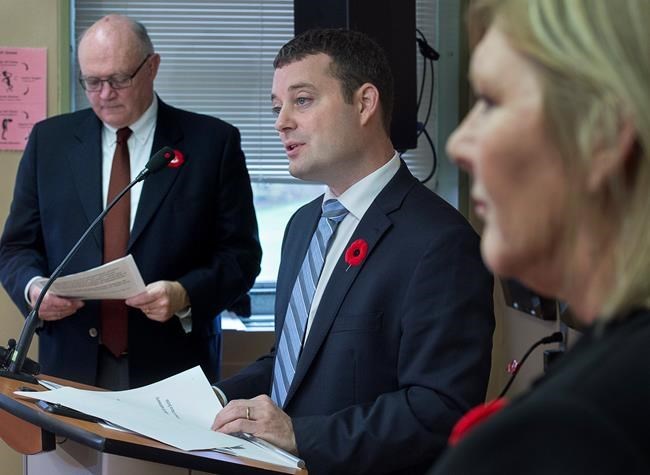
Nova Scotia Health Minister Randy Delorey is flanked by Dr. Robert Strang, left, chief medical officer, and Cindy MacIsaac, director of Direction 180 methadone clinic, at a news conference in Halifax on Wednesday, Nov. 8, 2017. The provincial government has added funds for treatment of opioid addictions as they face an ongoing crisis. THE CANADIAN PRESS/Andrew Vaughan
Republished November 08, 2017 - 10:46 AM
Original Publication Date November 08, 2017 - 6:06 AM
HALIFAX - Nova Scotia is expanding treatment for opioid addicts, as overdoses continue to take a steady toll of lives in the province.
The Liberal government outlined on Wednesday how it will spend $800,000 annually at a dozen treatment centres, with new locations in Antigonish, New Glasgow and on the province's south shore.
The centres will offer methadone maintenance programs, exchange needles, provide antidote kits for overdoses, and make referrals to family doctors for ongoing treatment.
The province says the added money — announced in the recent budget — will mean services will be available to 250 more people, for a total of over 1,600 people annually.
Health Minister Randy Delorey said the funding will eliminate a waiting list, which addictions specialists say is crucial to bring down the death toll of about 60 Nova Scotians annually.
So far this year, 39 people have died from overdoses, with 11 more probable deaths in Nova Scotia — figures similar to last year's death rate, said Dr. Robert Strang, the province's chief medical officer.
Specialists say getting addicts into contact with treatment systems quickly is a key part of bringing those numbers down.
"It can't be overstated. An increase in the capacity of our opioid use disorder treatment programs will save lives," said Dr. Sam Hickcox, a family physician who also is an addictions specialist, who attended the news conference at the Nova Scotia Hospital.
"The majority of the individuals we see do not need admission to hospital to manage their addiction to opioids. They recover best in the community."
Hickcox also said he's pleased that $70,000 annually will be used to set up an advice line for family physicians and others who encounter addicts.
That may include having the doctors themselves administer methadone and begin counselling people how to gradually come off the highly addictive painkillers, he said.
Strang said that while the overdose figures are remaining steady in the province, the risk of coming into contact with potentially lethal fentanyl-laced versions of opioids is rising.
Cindy MacIsaac, the director of the Direction 108 methadone clinic, says that adds urgency to getting people into treatment.
The veteran advocate described how in the past her centre had to tell addicts calling in and seeking help that nobody was available, losing opportune moments to begin treating their substance abuse.
Having four additional staff at her centre in Halifax will change that, she said.
"When that moment of opportunity opens, and they call, you can say, 'Come on in, we're going to get you assessed and we're going to get you to see a doctor right away,'" she said.
"Well, then there's hope."
However, MacIsaac said the province still badly needs a supervised safe injection site, a program that the province and the federal government have yet to arrange.
She said the sites give her staff a chance to engage with addicts to ensure they are using the potentially fatal drugs safely.
"As a result of that you can refer them on to treatment. Some may choose not to go on to treatment, to others it's an opportunity," she said.
"It's essential to keeping people alive."
Follow (at)mtuttoncporg on Twitter.
News from © The Canadian Press, 2017